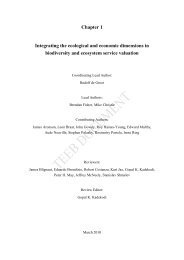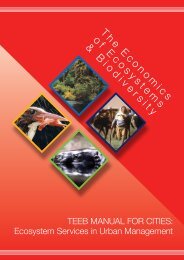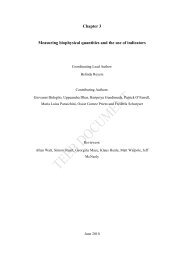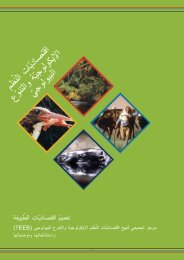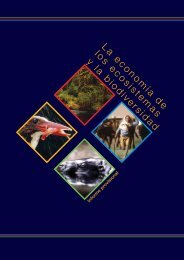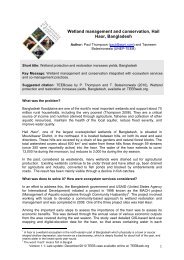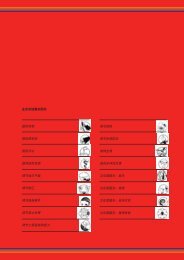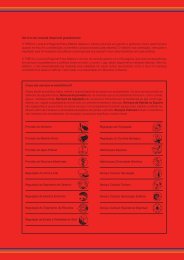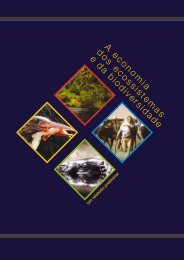Download (PDF, 6.71MB) - TEEB
Download (PDF, 6.71MB) - TEEB
Download (PDF, 6.71MB) - TEEB
Create successful ePaper yourself
Turn your PDF publications into a flip-book with our unique Google optimized e-Paper software.
5.4<br />
REWARDING BENEFITS THROUGH PAYMENTS AND MARKETS<br />
TAX AND COMPENSATION MECHANISMS<br />
TO REWARD STEWARDSHIP<br />
Economic instruments have a central – indeed indispensable<br />
– role to play in valuing nature’s public services<br />
to society (OECD 1999; Bräuer et al. 2006;<br />
Emerton et al. 2006; EC 2007). These services can<br />
be targeted by a range of policy instruments including<br />
levies (5.4.1), intergovernmental fiscal transfers<br />
(5.4.2) and government spending (5.4.3) (Ring 2002).<br />
Fiscal instruments to safeguard ecosystem services<br />
and biodiversity are part of the agenda for<br />
ecological tax reform (Meyer and Schweppe-Kraft<br />
2006; Ring 2008a). Such instruments could be used<br />
more widely to provide incentives for conservation<br />
and to raise funds for conservation (OECD 1999;<br />
Emerton et al. 2006: 39). Such tools are also central<br />
to social policy, including the redistribution of wealth<br />
and income – making them especially suitable for<br />
combining biodiversity and ecosystem conservation<br />
with poverty reduction (OECD 2005; World<br />
Bank 2005).<br />
5.4.1 USING PUBLIC LEVIES TO<br />
STIMULATE CONSERVATION<br />
As highlighted in this report, the value of biodiversity<br />
and many ecosystem services cannot always<br />
be captured by market mechanisms alone.<br />
Economic instruments such as taxes, charges and<br />
fees – as well as targeted exemptions from these instruments<br />
– are a crucial element of the policy<br />
maker’s toolkit and complement regulation (see<br />
Chapter 7), direct payments for services (PES, see<br />
Section 5.1 above) and voluntary approaches from<br />
certification, informal codes of conduct to non-binding<br />
agreements 25 . Economic instruments can provide<br />
strong incentives for more sustainable behaviour<br />
by citizens, businesses and even governments themselves<br />
– if they are well-designed and based on relevant<br />
indicators.<br />
Although land, property and income taxes have<br />
considerable potential to integrate and reward<br />
ecological concerns, they are rarely used for this<br />
purpose. Tax systems can provide a number of options<br />
to reduce existing tax burdens, either through<br />
credits or exemptions. A tax exemption can function<br />
like a PES to reward positive conservation efforts: the<br />
difference is that the PES is a direct payment for a<br />
service whereas the exemption is effectively a nonpayment<br />
(of moneys that would otherwise be due as<br />
tax). Even if the financial outcome is similar, the instrument<br />
design is different and so, often, is public<br />
perception. Some see tax breaks as a form of ‘thanks<br />
for efforts’ that are preferable to payments for services<br />
rendered, although in economic terms they may<br />
be equivalent.<br />
Tax exemptions or credits can be used to reward<br />
landowners who undertake biodiversity conservation<br />
or agree to forego future development in order to safeguard<br />
habitats (Boyd et al. 2000). Such exemptions<br />
take many forms and are found in a range of jurisdictions<br />
(Shine 2005). Familiar examples include conservation<br />
easements and tax incentives for land<br />
donation for conservation (see Box 5.17).<br />
Tax incentives are not limited to gifts of property or<br />
interests therein. In the Netherlands, for example,<br />
savers and investors are exempt from a capital gains<br />
tax if they invest in specified green projects or capital<br />
funds (Box 5.18).<br />
<strong>TEEB</strong> FOR NATIONAL AND INTERNATIONAL POLICY MAKERS - CHAPTER 5: PAGE 40



